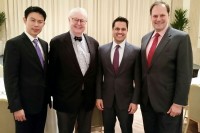
As published by International Law Prof Blog
The Intellectual Property Law Conference at The John Marshall Law School in Chicago featured a luncheon speaker on the Intellectual Property issues of the Trans-Pacific Pacific Partnership. The speaker was Probir J. Mehta, the Assistant U.S. Trade Representative for Intellectual Property and Innovation. [In the photo, left to right, are Professor Daryl Lim, Director of the John Marshall Center for Intellectual Property, Information & Privacy Law, Dean John E. Corkery, Mehta, and Professor Mark Wojcik). Mehta gave a broad overview of the intellectual property issues covered in the TPP, including matters affecting trademarks, copyright, patents, pharmaceuticals, data protection and enforcement.
The Trans-Pacific Partnership (TPP) is an agreement among 12 Pacific Rim countries to establish “a comprehensive regional agreement that promotes economic integration to liberalise trade and investment, bring economic growth and social benefits, create new opportunities for workers and businesses, contribute to raising living standards, benefit consumers, reduce poverty and promote sustainable growth.” It is also intended to make businesses more competitive in global markets, support the development of micro, small and medium-sized enterprises, and promote “efficient and transparent customs procedures that reduce costs and ensure predictability for their importers and exporters.” And a whole lot more.
The TPP was signed Feb. 4, 2016, in Auckland, New Zealand, after seven years of negotiation. Here are the 12 countries that signed the TPP. Each nation must now undergo its own process of ratification.
Australia
Brunei
Canada
Chile
Japan
Malaysia
Mexico
New Zealand
Peru
Singapore
United States
Vietnam
These countries represent an astounding 40 percent of the world’s GDP.
The Office of the United States Trade Representative (USTR) has a tremendous amount of information about TPP on its website, including the text of the TPP agreement.

